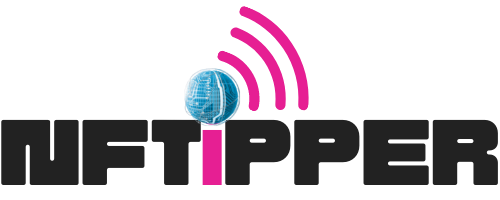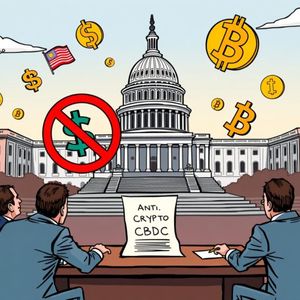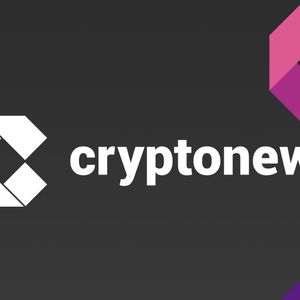

Anti-CBDC Act: U.S. House Debates Crucial Inclusion in Crypto Bill
BitcoinWorld Anti-CBDC Act: U.S. House Debates Crucial Inclusion in Crypto Bill A significant discussion is currently unfolding within the U.S. House of Representatives. Lawmakers are actively considering a proposal to integrate the Anti-CBDC act into a broader, comprehensive digital asset market structure bill. This move could have profound implications for the future of digital currencies in America. This development, initially reported by Cointelegraph, signals a critical juncture for cryptocurrency regulation. If this measure passes, the combined legislation would then advance to the Senate for further deliberation. What is the Anti-CBDC Act and Why is it Crucial? At its core, the Anti-CBDC act aims to prevent the U.S. government from issuing a central bank digital currency (CBDC). A CBDC is essentially a digital form of a country’s fiat currency, issued and backed by its central bank. Proponents of the Anti-CBDC act express significant concerns. They often highlight issues related to privacy, potential government surveillance, and the risk of increased financial control over citizens. The act seeks to safeguard individual financial freedom and limit government overreach in digital transactions. Many believe that a government-issued digital currency could pave the way for a ‘surveillance state,’ where every transaction is monitored. This perspective drives the urgent push for this protective legislation. A Pivotal Moment for Crypto Market Structure The proposed inclusion of the Anti-CBDC act is not happening in isolation. It is being considered as part of a larger digital asset market structure bill. This overarching legislation aims to provide a clear regulatory framework for the entire cryptocurrency industry. Establishing clear rules is vital for the growth and stability of the crypto market. Without proper guidelines, businesses and investors face uncertainty, which can hinder innovation and adoption. The market structure bill intends to address these regulatory gaps. Integrating the Anti-CBDC act into this bill means that the debate over central bank digital currencies is now firmly linked to the broader conversation about how digital assets will be regulated in the U.S. This connection elevates the importance of both legislative efforts. Past Battles and Future Prospects for the Anti-CBDC Act This isn’t the first time Republican lawmakers have attempted to ban the issuance of a central bank digital currency. Previously, they sought to include an anti-CBDC measure during a vote on the GENIUS Act, a stablecoin regulation bill. While that specific attempt did not succeed within the stablecoin bill, the commitment to the cause remained strong. Subsequently, the Anti-CBDC act successfully passed the House as a standalone bill. This earlier success demonstrates significant support for the measure. Now, by attempting to attach it to a broader digital asset bill, lawmakers are looking for a more direct path to enactment. This strategy could increase its chances of becoming law, as it would be part of a larger package deemed essential for the crypto industry. What are the Core Concerns Surrounding CBDCs? The opposition to CBDCs stems from several key concerns: Privacy: Critics fear that a CBDC could eliminate financial privacy, allowing governments to track every transaction. Surveillance: There’s a worry that a CBDC could enable a ‘surveillance state,’ giving authorities unprecedented insight into citizens’ spending habits. Control: Some argue that a CBDC could give governments the power to freeze funds, implement negative interest rates, or even program spending, limiting individual economic freedom. Disintermediation: There are concerns that CBDCs could bypass commercial banks, fundamentally altering the financial system. These points form the bedrock of the arguments in favor of the Anti-CBDC act , emphasizing the need for safeguards against potential governmental overreach. The Road Ahead: From House to Senate If the U.S. House of Representatives successfully incorporates the Anti-CBDC act into the digital asset market structure bill, the journey is far from over. The comprehensive legislation would then be sent to the Senate for its own round of deliberations, debates, and votes. The Senate process can be complex and time-consuming, with potential amendments and further negotiations. The outcome in the Senate is not guaranteed, and strong advocacy from both sides of the CBDC debate is expected. Ultimately, for the Anti-CBDC act to become law as part of this broader bill, it must pass both chambers of Congress and receive presidential assent. This legislative path highlights the critical nature of the current discussions in the House. The ongoing debate in the U.S. House over the inclusion of the Anti-CBDC act in the digital asset market structure bill marks a truly pivotal moment for the future of finance and individual liberties. This legislative effort underscores a growing concern among lawmakers about the potential implications of central bank digital currencies. The outcome of these discussions will not only shape the regulatory landscape for cryptocurrencies but also determine the extent of government involvement in digital money. It’s a debate that touches upon fundamental questions of privacy, control, and the very nature of money in the digital age. Keeping an eye on these developments is essential for anyone interested in the evolving world of digital assets. Frequently Asked Questions (FAQs) Q1: What is a Central Bank Digital Currency (CBDC)? A1: A CBDC is a digital form of a country’s fiat currency, issued and backed by its central bank. Unlike cryptocurrencies like Bitcoin, which are decentralized, a CBDC is centralized and controlled by the government. Q2: What is the primary goal of the Anti-CBDC act? A2: The primary goal of the Anti-CBDC act is to prevent the U.S. government from issuing a central bank digital currency, citing concerns about privacy, surveillance, and potential government control over individual finances. Q3: How does the Anti-CBDC act relate to the broader crypto market structure bill? A3: The Anti-CBDC act is being considered for inclusion in a larger bill designed to establish a comprehensive regulatory framework for digital assets in the U.S. This means the debate over CBDCs is now tied to the overall regulation of the crypto industry. Q4: What are the main concerns opponents have about CBDCs? A4: Opponents primarily worry about the erosion of financial privacy, the potential for government surveillance of transactions, and the risk of governments gaining excessive control over citizens’ spending and financial activities. Q5: What happens if the Anti-CBDC act is included in the market structure bill and passes the House? A5: If included and passed by the House, the combined legislation, including the Anti-CBDC act , would then proceed to the Senate for further deliberation, debate, and a vote before potentially becoming law. Q6: Has the Anti-CBDC act been debated before? A6: Yes, Republican lawmakers previously attempted to include an anti-CBDC measure in a stablecoin regulation bill. The Anti-CBDC act also passed the House as a standalone bill prior to this current consideration. If you found this article informative and believe in the importance of understanding legislative actions impacting digital currencies, please share it with your friends and on your social media platforms. Your support helps spread awareness and encourages a broader conversation about the future of finance. To learn more about the latest crypto market trends, explore our article on key developments shaping digital asset institutional adoption. This post Anti-CBDC Act: U.S. House Debates Crucial Inclusion in Crypto Bill first appeared on BitcoinWorld .














